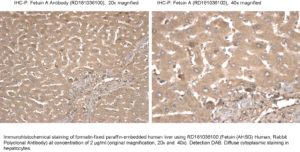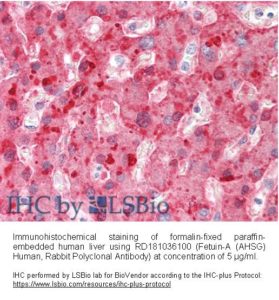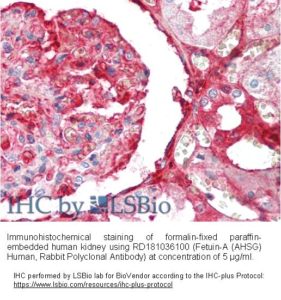Fetuin-A (AHSG) Human, Rabbit Polyclonal Antibody
Fetuin-A (AHSG), a 59 kDa glycoprotein, consisting of two cystatin-like domains and a smaller unrelated domain, is predominantly synthesized in liver. It is secreted into the blood stream and deposited as a noncollagenous protein in mineralized bones and teeth. Fetuin-A occurs in high serum concentrations during foetal life, whereas its level declines following infection, inflamatory and malignancy. Fetuin-A acts as an important circulating inhibitor of ectopic calcification, frequent complication of many degenerative diseases. Low serum level of Fetuin-A is associated with vascular and valvular calcification, atherosclerosis, malnutrition and higher cardiovascular mortality in chronic renal failure, liver cancer and liver cirrhosis patients on long-term dialysis. AHSG protein represents a natural inhibitor of tyrosinase kinase activity of the insulin receptor. It may play a significant role in regulating postprandial glucose disposal, insulin sensitivity, weight gain, and fat accumulation. The serum and bone-resident Fetuin-A binds to transforming growth factor-β and blocks TGF-β binding to cell surface receptors.
Type
Polyclonal Antibody
Applications
Western blotting, ELISA, Immunohistochemistry
Antibodies Applications



Source of Antigen
Human serum
Hosts
Rabbit
Preparation
The antibody was raised in rabbits by immunization with the Human Fetuin.
Species Reactivity
Human. Not yet tested in other species.
Purification Method
Immunoaffinity chromatography on a column with immobilized purified Human Fetuin.
Antibody Content
0.1 mg (determined by BCA method, BSA was used as a standard)
Formulation
The antibody is lyophilized in 0.05 M phosphate buffer, 0.1 M NaCl, pH 7.2. AZIDE FREE.
Reconstitution
Add 0.1 ml of deionized water and let the lyophilized pellet dissolve completely. Slight turbidity may occur after reconstitution, which does not affect activity of the antibody. In this case clarify the solution by centrifugation.
Shipping
At ambient temperature. Upon receipt, store the product at the temperature recommended below.
Storage/Expiration
The lyophilized antibody remains stable and fully active until the expiry date when stored at –20°C. Aliquot the product after reconstitution to avoid repeated freezing/thawing cycles and store frozen at –80°C. Reconstituted antibody can be stored at 4°C for a limited period of time; it does not show decline in activity after one week at 4°C.
Quality Control Test
Indirect ELISA – to determine titer of the antibody
SDS PAGE – to determine purity of the antibody
Note
This product is for research use only.
– Ketteler M, Gross ML, Ritz E. Calcification and cardiovascular problems in renal failure. Kidney Int Suppl . Apr;(94):S120-7 (2005)

